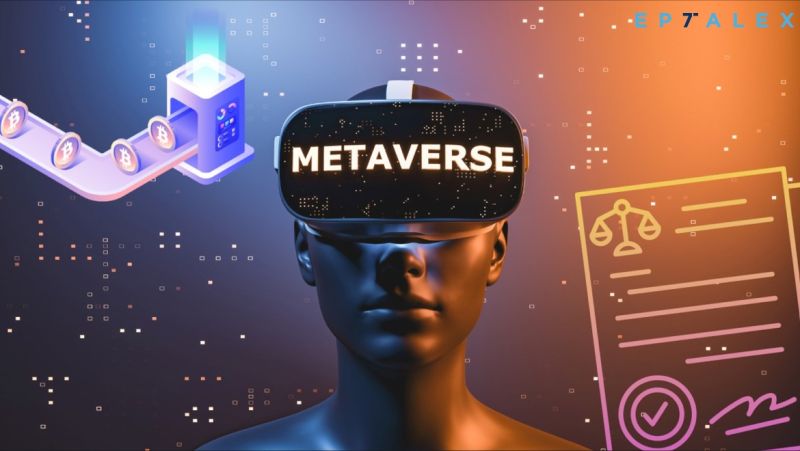“As the Internet of things advances, the very notion of a clear
dividing line between reality and virtual reality becomes blurred, sometimes in creative ways.”
– Prof. Geoff Mulgan
The Metaverse is considered to be a consistently[1] online, three-dimensional, virtual reality (“VR”) universe, a sort of parallel digital world. From virtual experiences that interested mainly role-playing video game aficionados gaming together online through their avatars[2], it expanded gradually into online shared platforms where users of all ages work, meet, play games, learn and socialize.
Encouraged by the success stories of Fortnite and Roblox games (among others) which reached younger users, tech giants and developers alike are increasingly investing in this virtual universe, inventing VR accessories and equipment, hosting in-game events and concerts and creating a virtual market to purchase in-game products: one has to ask the parents of children who use internet nowadays about how often they are faced with a request to buy “robux”[3] to purchase virtual products and avatars on the Roblox platform, or take into consideration the 45.8 million views of Travis Scott’s performance on the Fortnite platform across 5 shows in April 2020 and the 33 million views of Lil Nas X’s concert on the Roblox platform across 2 days and 4 shows in November 2020[4], to really grasp this evolution’s implications.
Many disputes have arisen on the Metaverse[5] and one might wonder if national laws are applicable to these disputes (I), and in the affirmative, if these laws are well-suited for such disputes (II).
- ARE NATIONAL LAWS APPLICABLE TO THE METAVERSE DISPUTES?
Several reasons can make us wonder whether the Metaverse should be regulated by laws in the first place (A). If the application of the law is established, the applicable law would need to be determined (B).
- Is the Metaverse a no laws’ land?
Petty disputes between users of the Metaverse related to hacking an account, not delivering purchased in-game products, insults or name calling… may lead us to wonder whether the Metaverse is a no laws’ land, a zone of “no law” within the meaning described by Jean Carbonnier, a prominent French jurist and law professor who tackled extensively the concept of “no law”[6].
For Carbonnier, the petty nature of some disputes created a lack of interest in resolving them since the costs associated with their resolution outweigh by far the value of the dispute; he illustrated this idea by many examples such as reading a newspaper at a newsstand without buying it.
Carbonnier also identified the “no law” phenomenon in cases where the law itself prohibits sanctioning behaviors in the absence of a written text: for instance, in criminal law where it is an internationally recognized fundamental right under article 11.2 of the United Nations’ Universal Declaration of Human Rights that:
“no one shall be held guilty of any penal offence on account of any act or omission which did not constitute a penal offence, under national or international law, at the time when it was committed…”.
Therefore, any act or omission that is not explicitly considered by law as a penal offence upon its occurrence, cannot be criminally prosecuted and sanctioned.
Applying this fundamental right to Metaverse disputes, the perpetrators of the virtual gang rape on Facebook’s Horizon Venues would not be prosecuted and sanctioned for rape before national criminal courts, since physical intercourse is an essential element of the rape crime pursuant to the laws and such intercourse did not occur on the Metaverse, despite the victim’s description of that VR experience as “real” in her blog post[7].
In fact, several recent Metaverse disputes are far from petty: copyright infringements by NFTs for instance gave rise to claims of damages in substantial value[8].
Besides, the terms of use of the virtual platforms themselves have dedicated a clause related to the law applicable to the disputes arising from, or connected to, the platforms.
Consequently, the “no law” status of the Metaverse remains an exception, illustrating mostly the novelty of the subject matter and the delay in adopting laws to regulate it.
Having established that the Metaverse is governed by laws, it is still necessary to identify the applicable law.
- Which law applies to the Metaverse?
When the terms of service that users have to agree to prior to getting access to a platform specify the law governing the disputes related to such platform, that law becomes agreed upon between the platform and the users. In this context, Roblox platform refers for example to the laws of the State of California, USA for the disputes between the platform and the users[9]; Fortnite platform refers to the North Carolina law.
However, in criminal matters, such as child pornography, harassment, libel, extortion, etc., the contractual choice of law cannot prevent the application of national laws, particularly the laws of residence of the victims of these criminal acts on the Metaverse. By way of illustration, article L 113-2-1 of the French Penal Code combined with article L 113-2 thereof apply the French penal law to any crime or misdemeanor committed through a network of electronic communication when the victim resides in France.
Furthermore, the penal laws of any country are potentially applicable to such crimes and misdemeanors, if there is a link between the crime or misdemeanor and that country.
Consequently, whether voluntarily selected in contractual matters or mandatorily imposed in criminal matters, “real” national laws are applicable to virtual Metaverse disputes while ironically at the same time virtual law firms are being established on some platforms in the Metaverse[10].
We should therefore examine whether these national laws are well-suited for the Metaverse disputes.
- ARE NATIONAL LAWS WELL-SUITED FOR THE METAVERSE DISPUTES?
While many countries have adapted their laws to regulate some Metaverse disputes by specific tailor-made laws (A), several Metaverse disputes would not be efficiently resolved by current national laws and need alternative solutions (B).
- Tailor-made national laws
Technologically advanced countries have realized early on that they need specific tailor-made laws and regulations to fight cyber-criminality. In the United Kingdom for example, the Computer Misuse Act dates back to 1990 although it has known several amendments. Similarly, the USA, South Africa, France, China, Australia, to name just a few, have adopted laws to fight cyber-crimes.
Other laws regulate cryptocurrencies, intellectual property rights in the context of non-fungible tokens (NFTs), consumer rights, and of course data protection which may all, among other laws, affect the rights and personal data of Metaverse users.
However, the Metaverse evolves in a fast-paced everchanging landscape which makes the task of regulating it by national laws extremely challenging. Moreover, cyber-crimes are rapidly increasing in social media platforms and since people using social media are from a younger age group, they are easy targets for fraud[11] and extortion. Indeed, whether through their use of social media or online gaming platforms, a recent alarming report of the U.S. Attorney’s Office of the Western District of Pennsylvania has revealed that over 3,000 minor victims were targeted by “sextortion crimes” in 2022 across the United States[12].
In any case, even if a country succeeds in modernizing its legal system to regulate this parallel universe, the efficiency of such tailor-made national laws remains challenged by enforcement issues when the perpetrator of a cyber-crime cannot be identified or is out of the reach of the country that has adopted these modern laws for instance.
So, how can we overcome these limitations of the current national laws?
- Alternatives to national laws
Similarly to other transnational matters, a traditional solution to the limitations of national laws is international cooperation under international conventions: whether under the Council of Europe’s Convention on Cybercrime of 2001 (also known as the Budapest convention) or under the United Nations’ Convention against Transnational Organized Crime (“UNTOC”), many international or regional treaties already propose acceptable solutions to the limited scope and enforcement challenges of national laws fighting cyber-crimes.
Metaverse disputes can also be resolved through the unilateral measures of the administrators of the various platforms or Lex Informatica[13]: indeed, when an issue is reported by the parties to the platform, and depending on its terms of use, its administrators may delete a post or a video, block an account, suspend the user, or amend the mechanism and reinforce the security and privacy features of the platform in order to resolve the issue and avoid future problems.
In this context, when the virtual gang rape occurred on Facebook’s Horizon Venues for instance, it was on a beta version thereof created for testing and feedback, and as soon as it was reported, the platform adopted a “personal boundary” feature ensuring that, by default, distance is kept between the avatars online[14], provided that they do not turn that feature off.
Furthermore, another original way to resolve Metaverse disputes is by “on chain”[15] dispute resolution mechanisms that do not apply laws and categorized as a “decentralized justice” or Lex Cryptographia[16]: for example, on the Kleros site[17], jurors who are users of the website and deposit a certain amount of Ethereum cryptocurrency can adjudicate disputes by a voting system: if they vote on a specific case like the majority of other jurors, they earn Ethereum as a reward, otherwise, they lose their deposit. Most jurors are likely to vote on the consensual truth about the dispute to be coherent with the majority’s vote. However, such consensual truth does not correspond necessarily to the solution that the applicable law, or any national law for that matter, brings to that dispute, making it therefore an alternative to national laws.
In any case, we believe that even if the technical features implemented by platform administrators provide a prompt resolution to the dispute, they do not suppress the ultimate intervention of national laws whether to control their legality, provide a compensation for the users who have incurred damages as a result of the actions of other users or the administrators of the platform, or to sanction online criminal behaviors: indeed, with the growing number of children using the Metaverse, it is dangerous to rely only on platforms to protect the users from cyber-crimes: the uncertainties surrounding the identity and liability of the perpetrators of such crimes (and others) hiding behind virtual avatars[18], and the absence of sanctions for a virtual rape are only an example proving that it remains crucial to apply and adapt national laws to resolve many Metaverse disputes.
[1] In reality, there are glitches to the various platforms which hinder the consistent existence of the Metaverse as a parallel universe, but we will focus in this article on the “ideal” of the Metaverse as a parallel universe.
[2] A figure/icon representing a person in a video game, internet forum, etc.
[3] A virtual currency used on the Roblox platform and bought with real money.
[4] https://www.theverge.com/2020/11/16/21570454/lil-nas-x-roblox-concert-33-million-views
[5] Among which the case of appropriation of Hermes’ famous Birkin bag design and trademark to create “Metabirkin” non-fungible tokens (“NFT”) filed in January 2022 before a Southern District New York Court, and a virtual gang rape case on Facebook’s social metaverse experience, Horizon Venues: https://www.indiatoday.in/world/story/british-woman-virtual-gang-rape-facebook-metaverse-1908629-2022-02-04
[6] Le “non-droit” in French: Jean Carbonnier, Flexible Droit, LGDJ, 2013: just like situations where the law was not applied in certain places (e.g. sanctuary granted by churches), or certain times (during the carnival).
[7] She stated: “virtual reality has essentially been designed so the mind and body can’t differentiate virtual experiences from real” and “in some capacity, my physiological and psychological response was as though it happened in reality”, refer to the link supra note 5.
[8] See “Metabirkin” case supra note 5.
[9] Section 16 of Roblox’s Terms of Use.
[10]https://www.afslaw.com/perspectives/press-releases/arentfox-schiff-opens-first-major-law-office-the-metaverse#:~:text=ArentFox%20Schiff%20is%20pleased%20to,in%20this%20new%20virtual%20world.
[11]https://www.researchgate.net/publication/347439774_Legislation_Related_to_Cyber_Crimes_in_United_Kingdom
[12] https://www.justice.gov/usao-wdpa/pr/sextortion-crimes-increase-talk-your-kids-now
[13] https://stanford-jblp.pubpub.org/pub/birth-of-decentralized-justice/release/1
[14] https://www.usatoday.com/story/tech/2022/02/04/meta-personal-boundary-horizon-worlds/6663797001/
[15] Through solutions automatically executed without the involvement of any third parties and without any additional action by the parties (i.e., on the blockchain, as opposed to “off chain”).
[16] https://stanford-jblp.pubpub.org/pub/birth-of-decentralized-justice/release/1
[17] Or a similar site called Aragon: https://aragon.org/aragon-court
[18] Namely, does the avatar erase the liability of the real-life person behind it for criminal behaviors?






